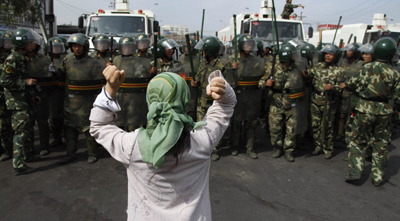‘The mob turned on us’: Foreign reporters in Xinjiang
Chinese authorities have, unusually, welcomed foreign reporters to Xinjiang since ethnic rioting broke out on Sunday in Urumqi between the Uighur minority and Han Chinese. A Beijing-based agency has even offered to facilitate travel, according to one writer who blogs from Shanghai. (CPJ hasn’t confirmed his story. Have any other reporters been approached in this…
China postpones installation of filtering software…for now
China’s Internet censors have blinked. In the face of opposition ranging from PC makers abroad to bloggers at home, the Ministry of Industry and Information Technology has backed away, at least for now, from a hastily conceived directive that all new PCs sold from July 1 should carry filtering software.
After Honduran coup, reporters detained, signals blocked
New York, June 30, 2009–Honduran military personnel briefly detained seven journalists, temporarily shut down several local broadcasters, and intermittently blocked the broadcast signals of international news channels in the aftermath of the weekend coup that ousted President Manuel Zelaya. The Committee to Protect Journalists today called on those in power in Honduras to allow the…
Stoking, not suppressing, dissent in China
A self-styled army of Internet users, Anonymous Netizens, has announced its intention to wage war on government censors, starting July 1. Global Voices Online has the text in English; it’s also here in Chinese. Whether their scheduled attack (its nature is not specified) will be felt or not, the irritation of the document’s drafters is…
With press council, Sri Lanka revives a repressive tool
There should be no doubt that the government is continuing its offensive against the media following its military victory over the Liberation Tigers of Tamil Eelam (LTTE). On Wednesday, Media Minister Lakshman Yapa Abeywardena confirmed what had been rumored for more than a week: The defunct Press Council, which was put to rest in 2002,…
At least 13 jailed as crackdown enters second week
New York, June 22, 2009–The Committee to Protect Journalists calls on Iranian authorities to release all journalists detained in the aftermath of the disputed presidential election and to lift the onerous press restrictions that are choking information at a time when the country and the world most need it. At least 13 journalists detained during…
CPJ alarmed by DRC’s ban on RFI broadcasts
Mr. President: We are alarmed by the government’s decision to indefinitely ban FM broadcasts of Radio France Internationale (RFI) in the eastern cities of Bunia and Bukavu. We call on you to use your influence to reverse these rulings, which we believe deprive residents of eastern Congo of access to diverse sources of information about the conflict in their region.
